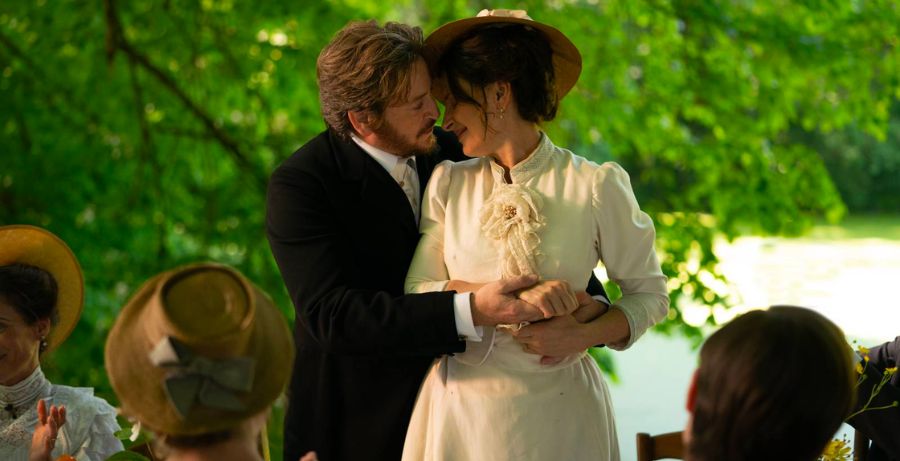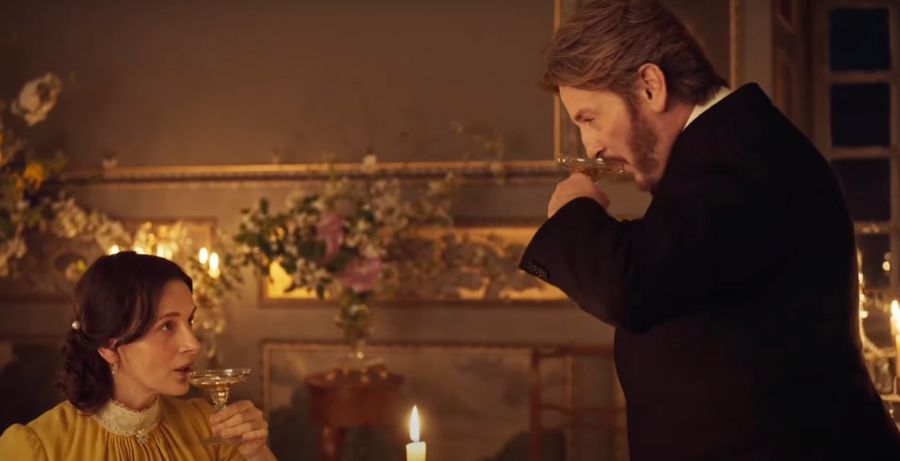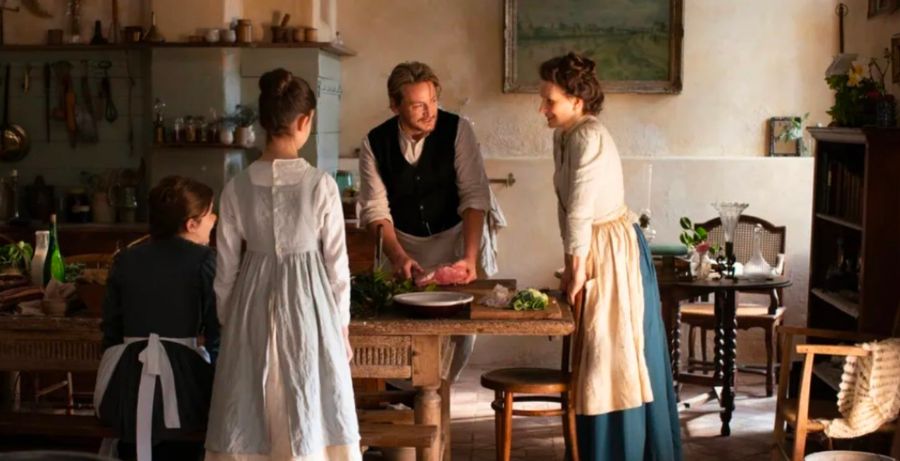Directed by Anh Hung Tran, The Taste of Things (La Passion de Dodin Bouffant) is a feast for the eyes and ears—perhaps the boldest and most illustrious depiction of food, its cooking, and the people involved set to film. In 1889 France, Dodin (Benoît Magimel) is a master cook and socialite in his “Autumn years” madly in love with his own cook of 20 years, Eugénie (Juliette Binoche). But when she refuses, as usual, to marry him, a movie lush with color, light, a lot of food, and a sweetly subtle romance blooms into an exploration of freedom and the stories we tell each other to shape our senses of self.
The Taste of Things is for anybody who has ever drawn a connection between preparing, eating, or sharing food and a love of any kind for the people with whom that experience is joined. It doesn’t matter the type of cuisine, the equipment used, or even necessarily the quality of the food itself, The Taste of Things expresses a universal language around food that anybody who has spent time in a kitchen with loved ones can understand immediately. The movie is rife with explicitly French cultural, culinary, and popular references that may easily fly over the non-French head. And its many, many dishes may be hard to exactly smell or salivate over for those disinclined from the cream and meat-centricity of the movie’s menus. But the technical and emotional prowess of every scene is at once sweet, savory, and sometimes quite bitter, just like every kitchen memory an audience member could conjure.
The film opens on a 14-minute sequence of Dodin, Eugénie, their assistant Violette (Galatéa Bellugi), and her prodigy niece Pauline (Bonnie Chagneau-Ravoire) preparing an elaborate, multi-course meal. Barely a word is spoken and there is no music in the background. There are only the sounds of the kitchen and the people within it. Sizzling pans, steaming pots, crackling fires, and banging utensils are an absolute feast for your eyes and ears. You can even hear every grunt and moan of chopped foods and savored wines. It’s a bit unsettling actually, at first. Dodin’s retinue of friends with whom he regularly dines can be almost mistaken for gluttonous the way you hear their every mouthful. But as you grow accustomed to the soundscape, its often these subtle, natural noises that render the kitchens and homes lived-in rather than just ornate setpieces (which practically, they absolutely are).

Within the kitchen, in particular, the camera spins around at a frantic pace while the cooks calmly and meticulously complete their work. It’s a drastic difference from the pace and depiction of modern kitchens. The camerawork implies incredible tension and difficulty in the labor, but the expressions on each character clarify that they are not under any kind of excessive pressure or displeasure. They take pride in their work and their results are immaculate.
The whole film, whether darting around the kitchen, moving through gardens, or strolling through flowery meadows is simply gorgeous. Color abounds from the plants and dresses and natural light is timed to present the most pivotal moments of gastronomy and love alike in the golden hours. Even when it is dark outside and the halls of Dodin’s manor are lit only by candles, the film has the wherewithal to backlight the set so that scenes are only dark when they are meant to be dark emotionally. The backgrounds are, however, often quite blurred out. This renders many of the scenes, which are marked with a rapid tracking camera or spinning motion, a bit dizzying. It also makes it harder to enjoy the full splendor of the gardens and kitchens at play. However, there are several scenes set in splendid meadows, forests, or waterfronts shot with gorgeous, broad composition and no blurring that nearly make up for it.
The Taste of Things contains countless stunning depictions of food and its preparation, but food is not just for its own sake. Food is a love language between friends, lovers, and protéges. As Dodin or Eugénie sit around with their friends enjoying a meal, countless ambling and meaningless stories are shared, just for the sake of spinning a tale. They ask Pauline to share the story of her experience trying their foods for the first time. Dodin especially, decidedly not a poet, waxes poetic on his thoughts about every meal and every moment he has loved Eugénie.

Their love is subtle and precious. It’s a low-heat flame that roasts gorgeously over a long period. Binoche puts on a stellar performance with emotional notes all over her face and body language while Magimel nearly matches her in a burly, masculine, sometimes bumbling, but also passionate, and affectionate way. When he cooks, every stroke is with the same evident love he has for her. And when Eugénie cooks, it’s with the same fierce independence that makes her passion for Dodin boil all the hotter.
The success of this romance is due in large part to the complete lack of machismo in Dodin or any man in this film. He and Eugénie are completely equals in life, work, and love. He’s not domineering or demanding, he’s kind and gentle and encouraging. He gets angry and has fits of passion, but that’s normal. He isn’t controlled by them. Money doesn’t even exchange hands in this film. The characters are obviously all wealthy and privileged, but their passions aren’t driven by greed; they’re simply lavishing in the joys of friendship and love. It’s a stark difference from the master chef, let alone the romantic lead that audiences may be used to.
Some of the The Taste of Things penultimate moments fizzle a little as some Oppenheimer “John F. Kennedy”-level moments of corniness wiggle their way into an otherwise highly emotional scene. But the landing is stuck superbly with an all-time crushing and memorable final line. Everything the movie pulled together about food, love, and storytelling culminates perfectly in this dessert of a final spin around the kitchen.
The Taste of Things is a stunning ode to food and the people who share it with one another. It’s as beautiful a depiction of the art of cooking as it is of love between its two cooks.
The Taste of Things is available now on VOD.
The Taste of Things
-
Rating - 8/108/10
TL;DR
The Taste of Things is a stunning ode to food and the people who share it with one another. It’s as beautiful a depiction of the art of cooking as it is of love between its two cooks.







